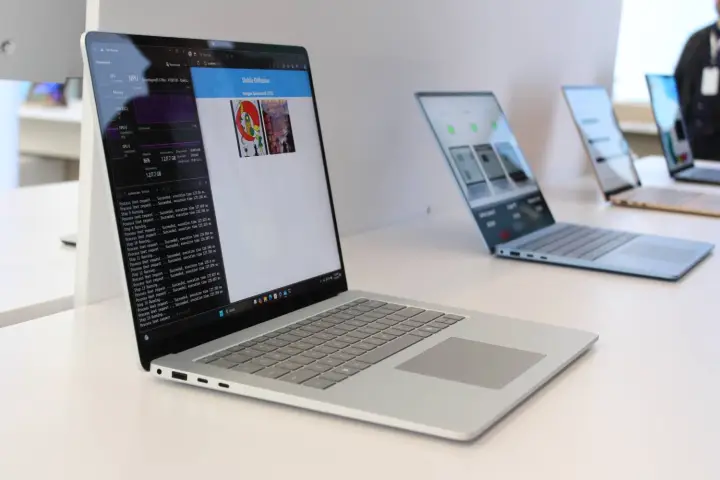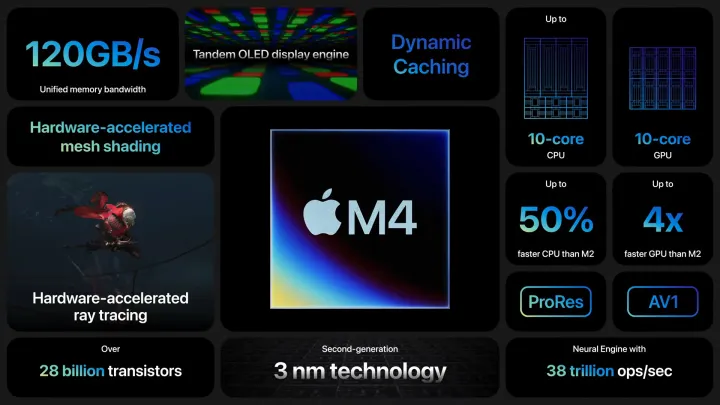MacBooks have had a good ride.
It’s been four years of running circles around Intel, AMD, Microsoft, and every laptop manufacturer with their Apple Silicon ARM chips. Until very recently, PC sales had been tanking too, all while Macs were holding steady.
But Apple’s grip on the world of thin, portable, powerful, and long-lasting laptops is over. With the new Copilot+ devices announced today, the playing field has been leveled and the bar has been raised. Having gotten a peek behind the curtain, let’s just say this: things are about to get very interesting.
Performance against the M3

Let’s cut to the chase: The new range of Copilot+ PCs really do have what it takes to challenge the MacBook Air M3. Qualcomm has spent the better part of this year making some ambitious claims about its new Snapdragon X Elite chips, but it’s been easy to write those off. Now, though, it’s real. I’ve seen in person the real laptops that you’ll be able to go and buy and that verify those claims.
“Number one, they will be the fastest, most performant PCs on the market by a very large margin,” Yusuf Mehdi, executive vice president at Microsoft, told us, referring to Copilot+ PCs. “You take the fastest, most performing PC out there, let’s say it’s a MacBook Air with an M3 processor. These PCs will outperform that by 50% on the Cinebench benchmark.”
Among a small group of media, I got to see those claims in action. There it was — the new 15-inch Surface Laptop running a variety of benchmarks side by side against the M3 MacBook Air 15-inch.
Ever since the release of the M1 MacBook Air, the industry-leading performance per watt of these chips has sent shockwaves through the PC market. At the time, the M1 was doing things in a fanless laptop that seemed impossible. Since then, Apple’s only continued to crank up that performance more and more over the years, making it hard to imagine Windows laptops ever catching up. But trust me — these Copilot+ PCs are the real thing.
Across the board, these new Copilot+ laptops are shown to be around 16% faster in multithreaded performance and 46% better in sustained performance over the 15-inch MacBook Air M3. This remained true in applications like Cinebench R24, Handbrake, Photoshop, and Geekbench 6. For example, in Geekbench 6, the new Surface Laptop scored 14,000 in multi-core, while the MacBook Air 15 M3 sat at around 12,000, hitting that 16% difference.

Because of the tighter restrictions provided by Microsoft, the company says there will be less variation in performance between models than in the past. That means you can expect these numbers to hold up, whether you’re going for a Dell XPS 13, the Lenovo Yoga Slim 7x, or the new Surface Laptop.
Making this all work, of course, required rebuilding Windows around ARM compatibility, including a new kernel, compiler, and schedulers. The whole system is now meant to optimize the CPU performance of ARM chips — whereas before, that was the main holdup. That apps themselves need to run natively too, which Microsoft has made some big advances on leading up to this launch.
Battery life

If MacBooks ever had a calling card, it’s been battery life. That was true before the Apple Silicon era, but it really became a clear distinguisher with the M1. MacBooks went from a few hours longer lasting to over twice as long. It’s not that MacBooks had better battery life — they were an embarrassment to Windows laptops.
That’s no longer true. I haven’t done the testing myself yet, but again, I was shown the side-by-side results of the new 15-inch Surface Laptop against the MacBook Air 15. Microsoft is claiming 16 hours of web browsing, which is one more hour of web browsing than is claimed by Apple. Battery testing is never apples-to-apples, but Microsoft also claims 20 hours in local video playback. We’re definitely in the ballpark of MacBook numbers and could potentially be even further along depending on the individual laptop.

How were the huge advances in battery life achieved? Well, the efficiencies of ARM provided Microsoft with lots of new power management capabilities that just weren’t there before. Standby power is a big part of what makes a MacBook feel like it lasts forever too — and that’s another area Microsoft dug in.
“When you’re done and you walk away from your computer, you come back hours, minutes, days, the next day, once you open that lid, the machine will be ready to go and log you in,” Pavan Davuluri, the lead of the Windows and Devices team, told us. “That required us to really focus on standby power. We minimized hibernation of the Windows platform itself.”
Remarkably, these new Copilot+ devices have to manage this incredible battery life while running persistent AI models in the background. That’s all thanks to the chip’s neural processing unit (NPU) performance, which is now up to 40 TOPS. I won’t get too much into it here — but suffice it to say that these always-on AI models would pose a huge problem to the battery life of currently available laptops.
The war’s only just begun

To verify any of this, of course, a lot of independent testing still needs to be done. And even with what we’ve seen so far, there are plenty of questions that remain. For example, single-core performance hasn’t been discussed, and that’s an area where the MacBook Air M3 still has the lead. There’s also the MacBook Pro to deal with, which this current swath of Copilot+ laptops don’t even attempt to address. The graphics alone set those laptops apart.
It also needs to be said — these Copilot+ laptops are really only the first step. In terms of their size and design, they don’t seem to all take advantage of the efficiency of these chips. Think of it like that first generation of M1 devices, which recycled old Mac chassis, just with a new chip inside. It wouldn’t be until the next generation of MacBook Air in 2022 when we got an updated design with a drastically smaller profile. None of these Copilot+ laptops are as thin as the MacBook Air — and none are fanless either.
Of course, there’s more to a laptop than just performance and battery life. MacBooks have some things Windows laptops still fumble, such as great speakers, fantastic build quality, and nearly perfect keyboards and trackpads.
But that’s the great strength of the Windows platform. There will be some laptops that attempt to emulate the quality of the MacBook, some that do something entirely experimental or find new ways to add value, and some that come in at a significantly cheaper price point.
Editors’ Recommendations

